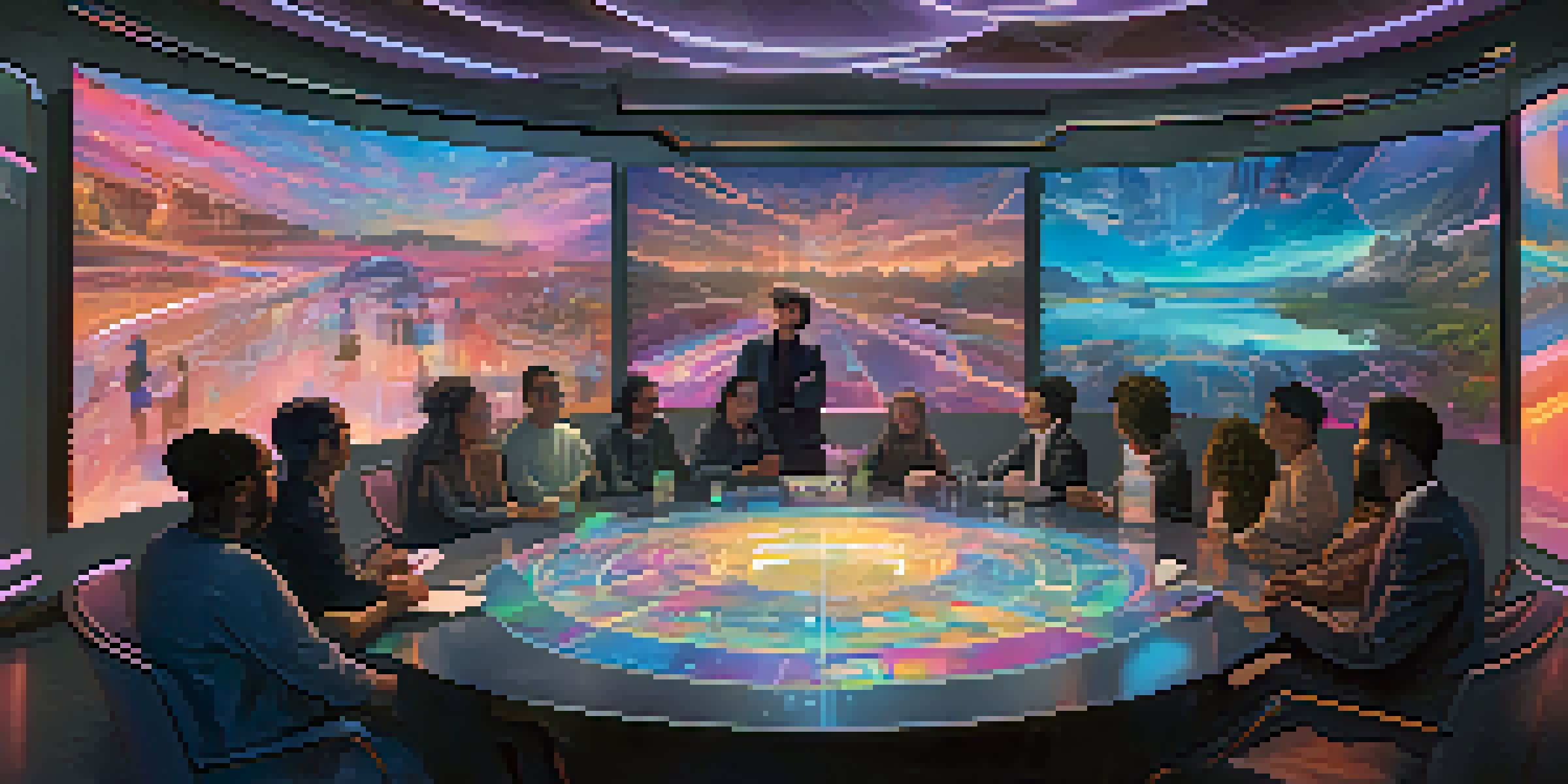The Influence of Community Voting Systems in DAOs

Understanding DAOs: The Basics of Decentralized Governance
Decentralized Autonomous Organizations, or DAOs, are digital entities that operate without centralized control, relying instead on smart contracts and community governance. Think of them as online cooperatives where each member has a say in decisions. This structure allows for greater transparency and inclusivity compared to traditional organizations, making it easier for contributors to feel empowered. As we delve deeper, we'll explore how community voting plays a pivotal role in these organizations.
Democracy is not a static condition; it is an active and ongoing process that requires the participation of all citizens.
In DAOs, every member typically holds tokens that represent their voting power. The more tokens you have, the more influence you wield in decision-making processes. This model not only encourages active participation but also fosters a sense of ownership among members. The ability to vote on critical matters, from funding projects to establishing policies, makes each member's involvement essential to the organization's success.
Moreover, the community voting system is designed to be democratic, allowing for diverse opinions to be heard. This is crucial in a digital landscape where stakeholders may be scattered across the globe. By leveraging blockchain technology, DAOs can ensure that every vote is counted fairly and transparently, reinforcing trust and collaboration among members.
The Role of Community Voting in Shaping DAO Decisions
Community voting is at the heart of DAOs, directly influencing the direction and operation of the organization. Members can propose initiatives, changes, or funding requests, which are then voted on by the community. This process not only ensures that decisions reflect the collective will but also nurtures a culture of accountability where leaders are answerable to their peers. For example, if a DAO wants to fund a new project, members will discuss, debate, and ultimately decide whether to proceed based on the majority's preference.

The effectiveness of community voting relies heavily on the engagement level of its members. An active and informed community can lead to more robust discussions and better decisions. Conversely, low participation can result in decisions that don’t represent the broader interests of the organization. Thus, fostering a vibrant community is essential for any DAO aiming to thrive.
Power of Community Voting in DAOs
Community voting empowers all members to actively participate in decision-making, ensuring decisions reflect the collective will.
Additionally, community voting can serve as a mechanism for conflict resolution within DAOs. When disagreements arise, a structured voting process allows members to voice their opinions and helps to reach a consensus. This democratic approach not only mitigates potential conflicts but also strengthens community bonds, as everyone feels their voice matters in the decision-making process.
Benefits of Community Voting Systems in DAOs
One of the most significant benefits of community voting systems in DAOs is enhanced transparency. Since decisions are made publicly and recorded on the blockchain, members can easily track how votes were cast and why certain decisions were made. This level of transparency builds trust within the community, encouraging more members to participate and share their insights. After all, when people feel they are part of something open and honest, they are more likely to engage actively.
The greatest danger in times of turbulence is not the turbulence; it is to act with yesterday's logic.
Another advantage is the democratization of power. Unlike traditional organizations where a small group often makes decisions, DAOs empower every member to contribute to the decision-making process. This collective approach not only diversifies input but also minimizes the risk of power centralization. Each voice can impact the DAO's trajectory, making governance more equitable.
Furthermore, community voting systems can lead to innovative solutions. When a diverse group of individuals collaborates, the range of perspectives can spark creativity and foster unique ideas. For instance, a DAO focused on environmental initiatives might receive various proposals from members, ultimately leading to groundbreaking projects that no single individual could have conceived.
Challenges of Community Voting in DAOs
While community voting systems have many advantages, they also come with challenges. One significant issue is voter apathy; not all members may feel motivated to participate in every vote. This can lead to a situation where a small percentage of active voters make decisions for the entire community, potentially skewing the representation of the group's interests. Encouraging consistent participation is an ongoing challenge for many DAOs.
Another challenge is the risk of vote manipulation or the influence of whale investors—those with large amounts of tokens. These individuals can disproportionately sway votes, undermining the democratic principles that DAOs strive for. Ensuring fair voting practices and implementing mechanisms to mitigate such risks is crucial for maintaining the integrity of the decision-making process.
Challenges of DAO Voting Systems
Despite their benefits, DAOs face issues like voter apathy and potential vote manipulation, which can undermine democratic principles.
Lastly, the complexity of some proposals can lead to confusion among voters. If members don't fully understand the implications of a decision, they may vote based on superficial information rather than informed judgment. It's essential for DAOs to prioritize education and clear communication to ensure that all members feel equipped to make sound decisions.
Technological Innovations Supporting Community Voting
Technological advancements play a crucial role in enhancing community voting systems within DAOs. Blockchain technology provides a secure and transparent platform for recording votes, ensuring that each decision is tamper-proof. Smart contracts can automate the voting process, allowing for seamless execution of decisions once a majority is reached. This innovation not only streamlines operations but also fosters trust among community members, as they can independently verify the outcome.
Moreover, various tools and platforms are emerging to facilitate community engagement in DAOs. For instance, decentralized voting applications allow members to cast their votes easily and view real-time results. These tools often come with user-friendly interfaces that make participation more accessible, even for those who may not be tech-savvy. By lowering the barriers to entry, DAOs can encourage broader involvement.
Additionally, some DAOs are exploring the use of quadratic voting, a system that allows members to express the intensity of their preferences rather than just a simple yes or no. This approach can lead to more nuanced decision-making, as it enables members to allocate their votes based on how strongly they feel about an issue. Such innovations can significantly enhance the effectiveness of community voting systems.
Case Studies: Successful DAOs Leveraging Community Voting
To illustrate the power of community voting systems in DAOs, let's take a look at some successful case studies. One notable example is MakerDAO, which governs the DAI stablecoin. MakerDAO's community actively engages in voting on risk parameters, collateral types, and governance proposals, ensuring that the stablecoin remains resilient and aligned with the community's needs. The active participation of its members has been instrumental in navigating challenges and adapting to market changes.
Another example is Aragon, a platform designed to create and manage DAOs. Aragon has implemented a governance model that allows its community to vote on key features and improvements. This approach has fostered a vibrant ecosystem where users can propose and vote on ideas, leading to continuous innovation. By prioritizing community input, Aragon has built a robust platform that evolves in tandem with its users' needs.
Innovations Enhancing DAO Participation
Technological advancements, such as blockchain and decentralized voting applications, are making community engagement more accessible and effective.
These case studies demonstrate that effective community voting systems can lead to better decision-making and a stronger sense of community. By actively involving members in governance, DAOs can create a more responsive and adaptive organization, ultimately contributing to their longevity and success in the rapidly evolving digital landscape.
The Future of Community Voting in DAOs
As DAOs continue to grow in popularity, the evolution of community voting systems is inevitable. The future may see enhancements in technology that further streamline the voting process, making it even more accessible and engaging for members. Innovations such as artificial intelligence could potentially analyze voting patterns to predict outcomes or suggest improvements, adding another layer of insight to governance.
Moreover, as more individuals become familiar with DAOs and their community voting mechanisms, participation is likely to increase. This growing engagement will not only benefit individual DAOs but also contribute to a broader understanding of decentralized governance. As education around blockchain technology and DAOs expands, we can expect a more informed and active member base.

Ultimately, the future of community voting in DAOs hinges on balancing technology, participation, and equitable representation. By addressing current challenges and embracing innovative solutions, DAOs can cultivate a vibrant community where every voice matters. This collective approach will pave the way for a more decentralized and democratic future in digital governance.